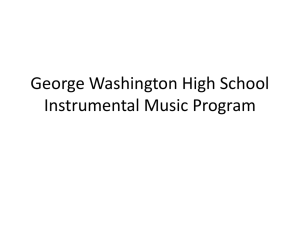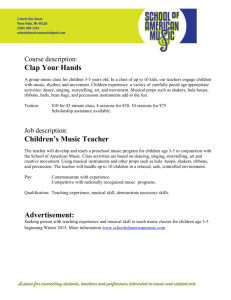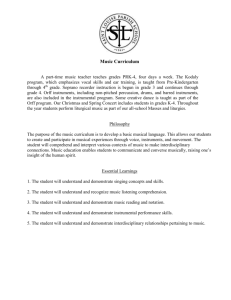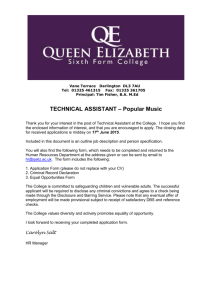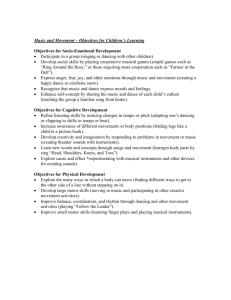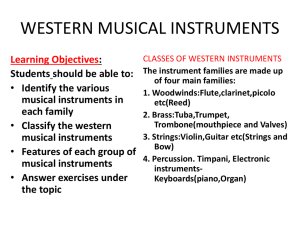Windermere Lesson Plans – April 15
advertisement
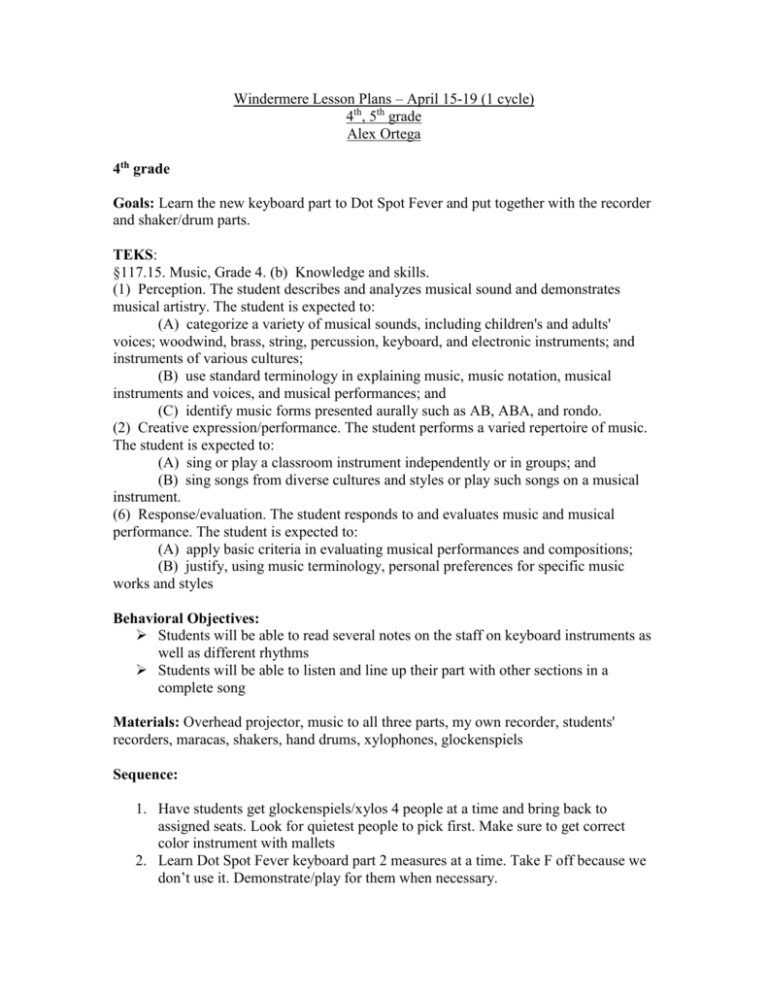
Windermere Lesson Plans – April 15-19 (1 cycle) 4th, 5th grade Alex Ortega 4th grade Goals: Learn the new keyboard part to Dot Spot Fever and put together with the recorder and shaker/drum parts. TEKS: §117.15. Music, Grade 4. (b) Knowledge and skills. (1) Perception. The student describes and analyzes musical sound and demonstrates musical artistry. The student is expected to: (A) categorize a variety of musical sounds, including children's and adults' voices; woodwind, brass, string, percussion, keyboard, and electronic instruments; and instruments of various cultures; (B) use standard terminology in explaining music, music notation, musical instruments and voices, and musical performances; and (C) identify music forms presented aurally such as AB, ABA, and rondo. (2) Creative expression/performance. The student performs a varied repertoire of music. The student is expected to: (A) sing or play a classroom instrument independently or in groups; and (B) sing songs from diverse cultures and styles or play such songs on a musical instrument. (6) Response/evaluation. The student responds to and evaluates music and musical performance. The student is expected to: (A) apply basic criteria in evaluating musical performances and compositions; (B) justify, using music terminology, personal preferences for specific music works and styles Behavioral Objectives: Students will be able to read several notes on the staff on keyboard instruments as well as different rhythms Students will be able to listen and line up their part with other sections in a complete song Materials: Overhead projector, music to all three parts, my own recorder, students' recorders, maracas, shakers, hand drums, xylophones, glockenspiels Sequence: 1. Have students get glockenspiels/xylos 4 people at a time and bring back to assigned seats. Look for quietest people to pick first. Make sure to get correct color instrument with mallets 2. Learn Dot Spot Fever keyboard part 2 measures at a time. Take F off because we don’t use it. Demonstrate/play for them when necessary. 3. Ask for volunteers to play recorder. a. Try to remember who was good at the recorder part. 4. Put the A section together with keyboard and recorder parts. 5. Now ask for volunteers for the shaker and drum parts. Remind them I’m only choosing the ones who have been respectful, attentive, involving themselves in the music activities, etc. 6. Try putting all of it together on the A section. 7. If time permits, keep learning more of the song. 8. At about 3-4 minutes left of class, start putting instruments away. Drums to the front of the class first. Then shakers. Then keyboards to their correct places/colors. Recorders last, in the bucket. 9. Line up and dismiss! 5th grade Goals: Assessment over instruments/sections on scratch piece of paper. Review answers/info from last week. Teach more about composers and have them take notes. TEKS: §117.18. Music, Grade 5. (b) Knowledge and skills. (5.1) Perception. The student describes and analyzes musical sound and demonstrates musical artistry. The student is expected to: (A) distinguish among a variety of musical timbres; (B) use standard terminology in explaining music, music notation, musical instruments and voices, and musical performances (5.2) Creative expression/performance. The student sings or plays an instrument, individually and in groups, performing a varied repertoire of music. The student is expected to: (A) perform independently, with accurate intonation and rhythm, demonstrating fundamental skills and basic performance techniques; (B) perform expressively, from memory and notation, a varied repertoire of music representing styles from diverse cultures; and (C) demonstrate appropriate small- and large-ensemble performance techniques during formal and informal concerts. (5.3) Creative expression/performance. The student reads and writes music notation. The student is expected to: (A) read standard notation (5.6) Response/evaluation. The student responds to and evaluates music and musical performance. The student is expected to: (A) apply criteria in evaluating musical performances and compositions; (B) evaluate, using music terminology, personal preferences for specific music works and styles Behavioral Objectives: Students will be able to identify, both aurally and visually, four distinct sections of instruments (Woodwind, brass, strings, percussion) Students will learn about the most important composers from the past as they take notes on notebook paper Materials: Projector, youtube, speakers, scratch pieces of paper, pencils Sequence: 1. Pass out notebook paper and pencil to each student as they walk into class and instruct them to go to assigned seat. 2. Begin short quiz with only 5 questions. Tell them to only write the answer, not the question. a. How is all sound created? b. What are the 5 main instruments of the woodwind family? c. What are the 4 main instruments of the brass family? d. What are the 4 main string instruments of the orchestra? e. Name 5 different types of percussion instruments. f. Bonus questions: What is the oddball instrument in a woodwind quintet? 3. Take up all papers when everyone is done. Go over answers: a. Vibrations b. Flute, Oboe, Bassoon, Clarinet, Saxophone c. Trumpet, French Horn, Trombone, Tuba. d. Violin, Viola, Cello, Double Bass e. Snare, bass, triangle, tambourine, xylophone, marimba, etc. f. French Horn 4. Pass out more paper and have them take notes on composers. Write down bullet points, with numbers, letters, dashes, etc. Whatever makes sense for them. a. Bach, Mozart, Beethoven, Wagner (Ride of the Valkyries), Brahms (Symphony No. 4), Tchaikovsky, Stravinsky (Rite of Spring), Debussy (Clair de la Lune), Verdi (La Traviata), Chopin (Nocturne), Liszt, Vivaldi (Four Seasons), Copland (Common Man), Rossini (Bugs Bunny operas – Barber of Seville http://www.youtube.com/watch?v=OloXRhesab0 @ 2:10), Schubert (Ave Maria) b. Go through as much as I can, finish up next class 5. Line up and dismiss! http://www.fasttopten.com/list/top-ten-classical-composers
